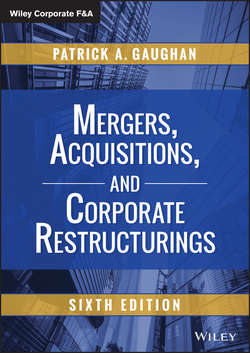Читать книгу Mergers, Acquisitions, and Corporate Restructurings - Gaughan Patrick А. - Страница 19
На сайте Литреса книга снята с продажи.
Part I
Background
Chapter 1
Introduction
Freeze-Outs and the Treatment of Minority Shareholders
ОглавлениеTypically, a majority of shareholders must provide their approval before a merger can be completed. A 51 % margin is a common majority threshold. When this majority approves the deal, minority shareholders are required to tender their shares, even though they did not vote in favor of the deal. Minority shareholders are said to be frozen out of their positions. This majority approval requirement is designed to prevent a holdout problem, which may occur when a minority attempts to hold up the completion of a transaction unless they receive compensation over and above the acquisition stock price. This is not to say that dissenting shareholders are without rights. Those shareholders who believe that their shares are worth significantly more than what the terms of the merger are offering may go to court to pursue their shareholder appraisal rights. To successfully pursue these rights, dissenting shareholders must follow the proper procedures. Paramount among these procedures is the requirement that the dissenting shareholders object to the deal within the designated period of time. Then they may demand a cash settlement for the difference between the “fair value” of their shares and the compensation they actually received. Of course, corporations resist these maneuvers because the payment of cash for the value of shares will raise problems relating to the positions of other stockholders. Such suits are difficult for dissenting shareholders to win. Dissenting shareholders may file a suit only if the corporation does not file suit to have the fair value of the shares determined, after having been notified of the dissenting shareholders' objections. If there is a suit, the court may appoint an appraiser to assist in the determination of the fair value.
Following an M&A it is not unusual that months after the deal as many as 10 % to 20 % of shareholders still have not exchanged their frozen-out shares for compensation. For a fee, companies, such as Georgeson Securities Corporation, offer services paid by the shareholders, where they locate the shareholders and seek to have them exchange their shares.
